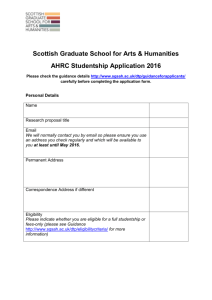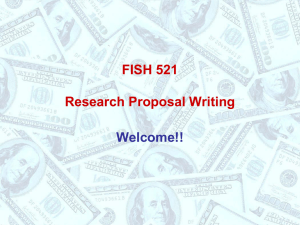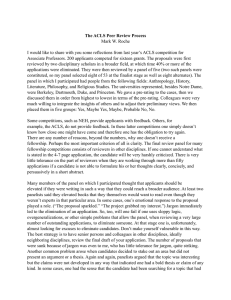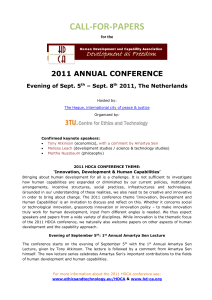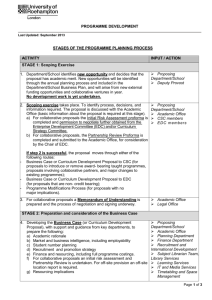Talking Points for NSF Seminar (Mulligan)
advertisement
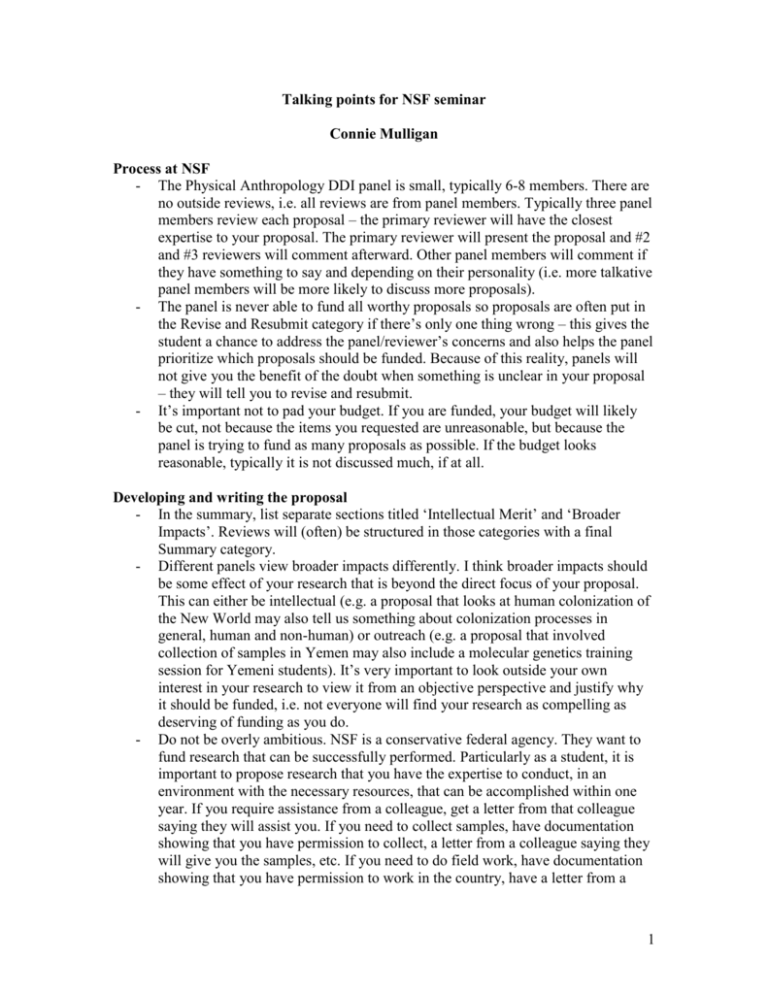
Talking points for NSF seminar Connie Mulligan Process at NSF - The Physical Anthropology DDI panel is small, typically 6-8 members. There are no outside reviews, i.e. all reviews are from panel members. Typically three panel members review each proposal – the primary reviewer will have the closest expertise to your proposal. The primary reviewer will present the proposal and #2 and #3 reviewers will comment afterward. Other panel members will comment if they have something to say and depending on their personality (i.e. more talkative panel members will be more likely to discuss more proposals). - The panel is never able to fund all worthy proposals so proposals are often put in the Revise and Resubmit category if there’s only one thing wrong – this gives the student a chance to address the panel/reviewer’s concerns and also helps the panel prioritize which proposals should be funded. Because of this reality, panels will not give you the benefit of the doubt when something is unclear in your proposal – they will tell you to revise and resubmit. - It’s important not to pad your budget. If you are funded, your budget will likely be cut, not because the items you requested are unreasonable, but because the panel is trying to fund as many proposals as possible. If the budget looks reasonable, typically it is not discussed much, if at all. Developing and writing the proposal - In the summary, list separate sections titled ‘Intellectual Merit’ and ‘Broader Impacts’. Reviews will (often) be structured in those categories with a final Summary category. - Different panels view broader impacts differently. I think broader impacts should be some effect of your research that is beyond the direct focus of your proposal. This can either be intellectual (e.g. a proposal that looks at human colonization of the New World may also tell us something about colonization processes in general, human and non-human) or outreach (e.g. a proposal that involved collection of samples in Yemen may also include a molecular genetics training session for Yemeni students). It’s very important to look outside your own interest in your research to view it from an objective perspective and justify why it should be funded, i.e. not everyone will find your research as compelling as deserving of funding as you do. - Do not be overly ambitious. NSF is a conservative federal agency. They want to fund research that can be successfully performed. Particularly as a student, it is important to propose research that you have the expertise to conduct, in an environment with the necessary resources, that can be accomplished within one year. If you require assistance from a colleague, get a letter from that colleague saying they will assist you. If you need to collect samples, have documentation showing that you have permission to collect, a letter from a colleague saying they will give you the samples, etc. If you need to do field work, have documentation showing that you have permission to work in the country, have a letter from a 1 - colleague in country who will assist you, etc. The only exception to this is IRB approval – it is standard to wait until you have funding to apply for IRB approval and all NSF panels know this. This preparation shows the panel that you are ready to go with the proposed research, that you’ve already given thought to the logistics of your research and have started the process to start the research. Then, if you are funded, you are ready to hit the ground running and your research has a much greater likelihood of being successfully completed. Before you submit your proposal, send it to several other professors to review (other than your PI). These professors do not have to be committee members, you should choose them based on their expertise. Oftentimes, they may not be at UF (this has the added advantage of expanding your network of colleagues and potential collaborators). Send these reviewers a near final version of your proposal that has no spelling or grammatical errors, etc. Do not send a rough draft – it you want to discuss ideas with someone before you start writing, arrange a meeting or phone call. You should send your proposal to these reviewers at least one month before your submission deadline – this will give them ~2 weeks to review it and give you ~2 weeks to address their comments. 2






